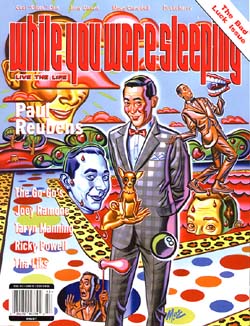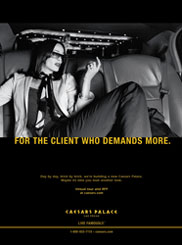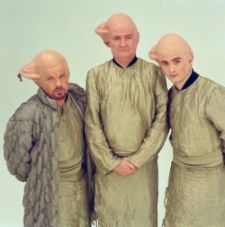 I'm Cool. Really, I Am The sex-laden lad magazine category that includes Maxim and Stuff has been getting all the press lately but there is another category of magazines worth exploring if you are interested in reaching the 18-24 year old demo. It's a category of magazines focusing on the "trend conscious outsider" who's living the hip urban lifestyle and yearning for confirmation of their cool factor. These magazines include Anthem, The Fader, Mass Appeal, Vice, While You Were Sleeping, and Tokion. Editorially, they are an eclectic mix of sex bordering on pornography with a bit of politics thrown in for good measure.
Intriguingly, the fact that these magazines exist and claim to cover "cool" makes them uncool. As we all know and as the author of this article points out, once something is deemed cool it is cool no longer and the readers of these magazines are just wanna-be cool hunters.
"The truly cool tend to come from outside this cohort and have no need of political or sexual prescriptions, much less magazines that tell them what they already know."
Moving past the "not cool because it's deemed cool" line of thinking, there's no reason why advertisers shouldn't tap this market. Let's face it, not everyone can be insider-cool. The "insider-cools" define cool yet represent a small number far too insignificant and far too difficult for a marketer to reach. The "wanna be cools" is where the money is at. They take cool and make it a trend. It's where the defining theory of cool becomes a reality that can be monetized.
 Cigars For Caesars In Amy Corr's Mediapost Out to Launch column this week, several new campaign launches are reviewed including a campaign to promote Caesars Palace featuring Cigars, blackjack and a group of babes enjoying a night out together.
Other campaigns this week include a Kellog campaign promoting Nutri-Grain Granola Bars with a mock marathon, a campaign for Subway featuring a dude in a cheerleading out fit, Timex's launch of its new tagline, "Life is Ticking," Computer Associates promoting its management software and PSAs from the AdCouncil for Give Kids the World promoting trips to Florida.
 Brennan Leaves Burnett Bob Brennan will leave Leo Burnett as President. Brennan had been at the post for three years after having held other management possitions at the Chicago-based ad agency. Burnett Chariman and CEO Linda Wolf will fill Brennan's role temporarily.
The agency has undergone many changes in the last few years having consolidated under the Bcom3 umbrella followed by the aquisition by Publicis. Brennan had been with Leo Burnett since 1982 holding positions in media and rising to CEO of Starcom/Mediavest prior to leaving media and taking the agency president position.
The practice of product placement whereby an advertiser secures a position within the content of a television show or movie has come under fire from Commercial Alert, a Portland, Oregon based consumer watchdog group founded by Ralph Nadar and Gary Ruskin. The group has filed a complaint with the FCC claiming marketers and networks that engage in product placement strategies are deceiving the public and has asked that guidelines be established.
The resurgence of product placement, popular in the 50's, is in reaction to the rising costs of commercial television time and declining viewership.
Marketers spend billions of dollars every year developing and advertising taglines hoping consumers will remember them, understand them and act on them. Well, according to a recent study by Emergence, most of that money is wasted. Only 6 out of 22 taglines from major U.S. marketers were remembered by more than 10 percent of those surveyed. Even more damaging to those who preach the benefits of a good tagline was the revelation that slogans from three major marketers received a zero percent recognition level. The losers were Circuit City (We're with you), Kmart (The stuff of life) and Staples (That was easy). Wal-Mart was the only high scorer in the study receiving a 64 percent recognition level.
The reason for this is simple. Marketers are fickle and come up with ridiculous reasons to reposition their companies hence the need for a new logo, tagline or campaign. Mostly, it happens when a new marketing director joins a company and has to make his mark so he hires a new ad agency and crafts a "new direction" that will "resonate more clearly" with today's consumer replacing the previously "stale" image. That's such bullshit. It takes decades to create a level of awareness and brand understanding and most marketers today do not have the patience for that to happen.
Recently, GE changed it's tagline from "We Bring Good Things to Life" to "Imagination at Work" in an apparent effort to explain its expanse into other lines of business such as jet engines and wind power. The first tagline, created twenty years ago, was well understood and broad enough to encompass any new business segment. Now, GE with only a 3% awareness of the new tagline will have to wait another twenty years before they can, again, have a level of recognition or par with their "Good Things" days. Perhaps marketers will realize that, based upon this study, change is not good and the need for having a tagline in the first place may be unnecessary.
Kellogg Co. knows many people don't have time for breakfast at home, so the cereal maker is trying to serve it up during their morning dash to work -- literally.
As part of a new advertising campaign for Kellogg's Nutri-Grain granola bars, actors dressed as commuters but with marathon race numbers pinned to their suits will mingle with real commuters to hand out free samples of the food bars.
The 'mock marathon,' which will take place in eight U.S. cities, will also feature cheering onlookers behind barricades, rooting for the commuters and their Kellogg counterparts.
This approach makes perfect sense in the increasingly crowed media marketplace where consumers simply tune out marketing messages because there are so many of them. Along with this type of street marketing there will be an increase in product placements within television shows as well as the creation of entire television shows centered around an advertiser's product.
 Earth Too Screwed Up For Aliens Starring Jim Broadbent, Eddie Izzard and Joseph McFadden, a viral video launched by Greenpeace uses humor rather than scare tactics to illustrate the plight of planet Earth. In the video, a group of aliens discusses the pros and cons of taking over the planet and the habits of the human race such as emailing which is descibed to a curious alien as "a means to effectively distribute porn."
Created by HHCL/Red Cell on the United Kingdom, the video hopes to sway "armchair activists" by providing them with information that could help them take that first step towards saving the environment.
 Finally, Honesty in Airline Advertising A sanctioned spoof of Alaska Airlines, SkyHigh Airlines pokes fun at the sometimes maddening experience of airline travel. With taglines such as "The Relentless Pursuit of Adequacy" and "Flying is Expensive. Let us Cheapen the Experience", SkyHigh Airlines highlights its signature feature "Challenge Seating" whereby customers fight each other for first class seating. A very comical "Letter from the Chairman" is written the way any Chairman would write if they where actually able to speak the truth about their business.
Deep within the reservation section, Alaska Airlines is revealed with this disclaimer: "Some of you people out there don't appreciate SkyHigh's extra stopovers a long the way - a perk we like to call "talking the scenic route." If you're one of those types, head to alaskaair.com. They offer a lot of non-stops there. (Bo-ring.)"
The site also features a reservation section where seating choices are "Bench" or Cargo" and an Employee of the Month section honoring an employee "who really gives that requisite effort to keep our passengers happy. Or at least less mad." There are vacation packages to Waco, Fargo and the "Chain Gang Fantasy Camp" and a Global Baggage Tracker that, upon entering your name, attempts to locate your luggage with returning this reassuring results page header, "Your luggage has been has been located in exotic Siple Island, Antarctica (Sorry, our mapping system does not include Antarctica. But trust us.). Check back tomorrow to see where those pesky bags of yours have run off to next." And finally, a very humorous Suggestions section that forces positive comments into the suggestion box just as you are about to enter your own.
In this campaign, Alaska Airlines has the admirable honesty to acknowledge the frustration and madness that goes along with airline travel.
This years report includes 22 profiles of media stars in its annual report. The report measures the number of times a media professional is mentioned in editorial articles. It's an interesting metric since the number of press mentions really has nothing to do with the ability to craft a great media program but rather the ability to shout the loudest and hound the press most effectively. Top spot this year goes to Wendy's Michelle Fedurek.
 Connect Me Now? In this week's Ad Age TV Spots of the Week, Verizon continues its attack on Nextel's Direct Connect with its own new Push to Talk feature. In the spot, a construction worker is trying to get a signal before his building permit gets pulled. While walking around to find a signal, he encounters some unexpected feet.
Also this week are spots from Canon showing what digital cameras are really for, a Dad in a minivan full of kids fretting over dental costs for Valvoline, the Amica man popping out of a supermarket fridge to fix a squeaky shopping cart wheel, two boring car commercials from BMW and Cadillac, Celine Dion smirking for her new perfume, a game of office frisbee for T-Mobile, and old time cartoon characters for American Express.

|







